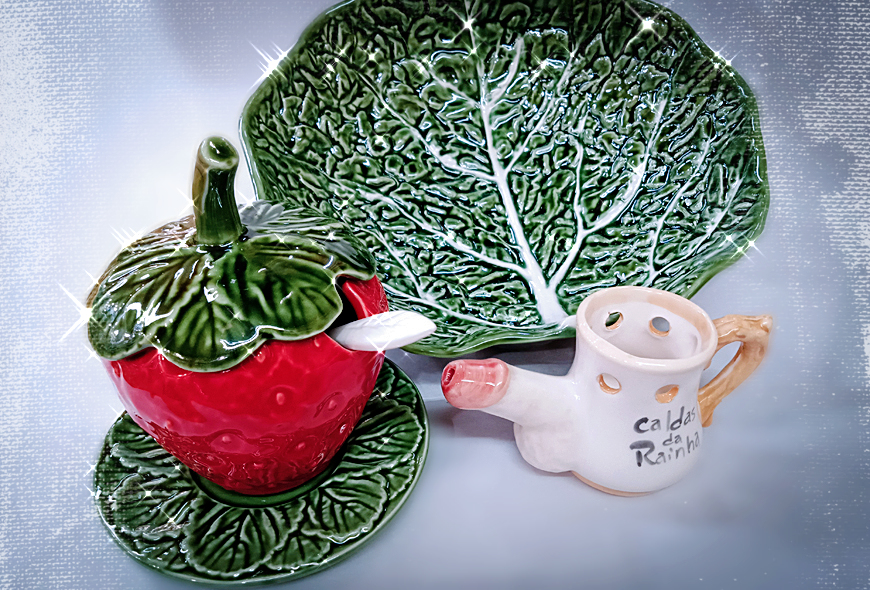Caldas da Raínha / Óbidos and the Phallic Art

Rafael Bordalo Pinheiro was one of the artisans of Caldas da Rainha and was the main figure responsible for popularizing vegetable-themed ceramics in Caldas da Rainha. He accepted an invitation to lead the artistic department of the Fábrica de Faianças das Caldas da Rainha, where he began creating a vast collection of pieces inspired by nature, especially vegetables like cabbages, pumpkins, lettuces, leaves, and fruits.
His intention was to bring elements of daily life into the world of ceramic art, giving a realistic and, at the same time, humorous touch to the pieces. Bordalo's vegetable ceramics line quickly became famous for its original and detailed style and remains one of the icons of Portuguese ceramics today.
Although Rafael Bordalo Pinheiro was the most famous and innovative in using vegetables and nature elements in the ceramics of Caldas da Rainha, the concept was not exclusively his. Before and during the time Bordalo worked, other Portuguese artisans were already exploring natural forms like vegetables and fruits in ceramics.
However, Bordalo Pinheiro gave a new impulse and identity to this trend, incorporating his humorous and detailed style, which made his pieces distinctive. He elevated the concept of decorative ceramics with vegetables, making it a unique style for his factory and for Caldas da Rainha.
The ceramic models created by Rafael Bordalo Pinheiro, especially those with vegetable shapes and humorous figures, are strongly associated with his brand and the Fábrica de Faianças das Caldas da Rainha, which he founded. The factory, now called "Bordallo Pinheiro," holds the rights to many of his original designs and still produces these pieces using traditional molds and processes. Thus, these specific models are exclusive to the "Bordallo Pinheiro" brand and are legally protected.
Nevertheless, the concept of ceramics inspired by vegetables or natural forms is not exclusive to Bordalo. Other artisans can create pieces with similar themes, but they cannot replicate his specific designs or use the name "Bordallo Pinheiro" without permission. The factory and brand today protect this heritage, ensuring that Bordalo's original models remain unique, preserving the style and authenticity he established.
Therefore, in our store, we have traditional ceramics from Caldas da Rainha, acquired from other artisans in Óbidos (near Caldas da Rainha). Some pieces of the famous vegetable-themed Bordalo Pinheiro tableware, such as cabbages, lettuces, and other vegetables, are often painted with a spray gun. This method allows for a more uniform and efficient finish, especially for covering large surfaces or producing on a larger scale.
In our store, traditional ceramics from Caldas da Rainha are the only traditional ceramics that are not hand-painted, as all others from various regions of Portugal are hand-painted.
The "Bordallo Pinheiro" brand belongs to the Vista Alegre group. In 2009, Vista Alegre, one of the largest porcelain and crystal companies in Portugal, acquired the Fábrica de Faianças Artísticas Bordallo Pinheiro, ensuring the preservation and continuity of the ceramic tradition of Caldas da Rainha. With this acquisition, Vista Alegre invested in modernizing the factory and expanding Bordallo Pinheiro's product line while maintaining the traditional production and distinctive style that made the brand famous. This partnership allowed Bordallo Pinheiro to reach new international markets, increasing the recognition of Portuguese ceramics.
The Phallic Art of Caldas da Rainha
The "phallic art" of Caldas da Rainha refers to the tradition of creating ceramic pieces in phallic shapes, originating from the Portuguese town of Caldas da Rainha. This practice is linked to popular humor and social satire, producing ceramic pieces that typically have phallic shapes and are used both as decorative elements and humorous gift items.
The ceramics of Caldas da Rainha, famous for their irreverence and creativity, were popularized by master ceramists such as Rafael Bordalo Pinheiro, one of the main artists responsible for establishing the fame of Caldas ceramics. His creations included both utilitarian tableware and satirical and erotic pieces that explored humorous and social themes. Phallic ceramics became a cultural icon and remain one of the most sought-after souvenirs by tourists in the region today.
The tradition of Caldas ceramics has diversified over time, and today there is an active community of ceramists in the city who work with various styles but maintain the irreverent and unique humor that has become characteristic of the region.
In terms of legality, the production of erotic ceramics or pieces with phallic themes is entirely legal in Portugal, provided it is intended for adults and complies with local display and sales regulations. This tradition is culturally accepted and recognized as part of local craftsmanship.
The story of a Portuguese king who supposedly commissioned a phallic object to entertain the court is part of the folklore and legends surrounding Portuguese culture, but there are no concrete historical records to confirm this fact. This story is often attributed to King Luís I (1838–1889), known for his refined humor and appreciation for the arts. It is said that he may have ordered a phallic ceramic object, possibly to surprise or entertain friends at court, though this narrative may be more of a popular legend than a verified history.
This association with King Luís I might have emerged as a way to attribute a noble and humorous origin to the phallic tradition of Caldas da Rainha, especially considering that the king was married to Queen Maria Pia, known for her involvement in artistic and cultural development in Portugal. It is possible that this story has taken root in popular imagination precisely because it fits well within the context of the irreverent ceramics of Caldas, perpetuated by Bordalo Pinheiro’s work.
Therefore, while the story is entertaining and rooted in folklore, there are no historical sources to confirm it.
Phallic art has very ancient origins and is present in various cultures worldwide, generally associated with symbols of fertility, prosperity, and power. Since prehistoric times, phallic representations have been used in objects and rock art to invoke fertility and protection and are also related to fertility rituals.
It is especially a fun type of ceramic intended for people with a good sense of humor, making it an ideal gift if you’re looking to play a prank on a friend.
